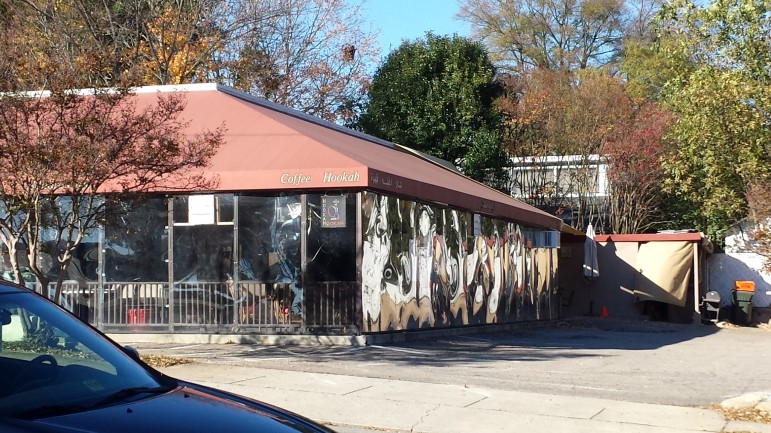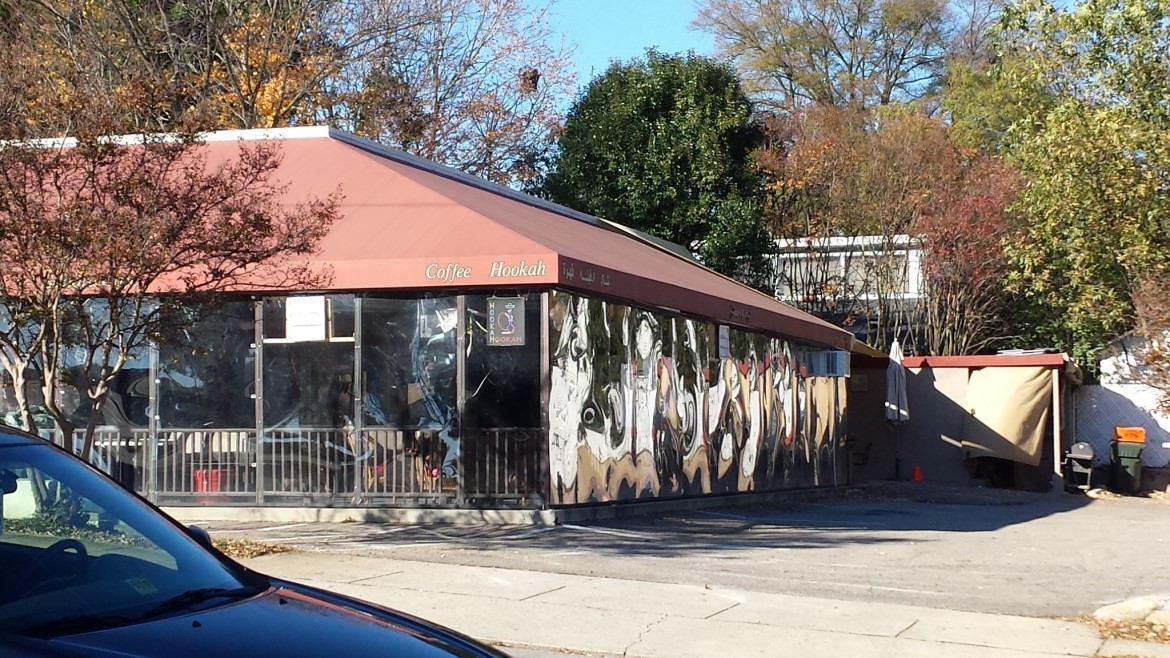Hookah bars are back in Council committee.
Residents in a North Boylan neighborhood say there are still problems surrounding the Sahara Hookah Cafe on Peace Street.
The number of incidents, such as littering and harassment, have decreased since parking restrictions and increased police patrols were implemented last year.

Staff / Raleigh Public Record
The Sahara Hookah Cafe at the corner of Glenwood and Boylan.
Yet neighbors say other problems with parking and noise continue. Parking restrictions that require permits for residents and their guests seems to have played a role in cutting down on neighborhood disturbances, but visitors to the area have started parking in the Partnership Elementary School lot.
Raleigh Police Capt. Robert Council told members of the Law and Public Safety Committee Tuesday that school officials are hesitant to lock up the lot because other organizations use the school after hours. Residents also have an agreement with the school to use the lot as alternative parking. Council said despite the neighborhood complaints, the calls for service associated with the lot are very low.
The RPD’s Council also said the calls to the police at the Sahara have decreased dramatically. Since the first of the year, there have been only nine calls.
“It’s still difficult for us to gauge those calls for service as to whether they’re specifically related to the hookah bar or other locations in and around there,” Council said. “I still think that’s the challenge.”
Regulating Location
Neighborhood resident Phil Poe said the key issues with the hookah bar are its location and hours of operation, echoing comments he made almost a year earlier. The bar does not sell alcohol, but Poe said patrons of other Glenwood businesses head over to the Sahara after the other bars close as 2 a.m.
These types of late-night establishments, he said, don’t belong so close to residential neighborhoods.
City Attorney Tom McCormick said in order to implement radius requirements, the city would have to show negative secondary effects on the surrounding neighborhood. Strip clubs and adult shops have documented negative secondary effects, which is why it is legal to impose radius requirements.
Of the eight or so hookah bars police were able to identify, half have never had any calls for service. Paradise Hookah Lounge on Capital Boulevard has had 21 calls for service, which include a stabbing, fights and an assault.
McCormick said while there may be issues with a particular business, they don’t provide a compelling case to regulate the entire industry differently than other businesses.
Unlike bars, taverns or lounges, hookah bars aren’t specifically defined in the city’s zoning code. Planning Administrator Travis Crane said depending on the business, hookah bars could be considered a lounge if they don’t serve food or beverages, or a restaurant, if they do.
“Not all hookah bars are identical,” he said.
Prior to being a hookah bar, the Sahara location was a full-service restaurant. McCormick said it would be hard to justify why a restaurant or a bar could be allowed in the space, but not a hookah bar. According to Wake County real estate data, the space has held everything from a Kentucky Fried Chicken to “Steak-Out” over the years.
Resident Dan Gearino said like food trucks, hookah bars are a new enterprise, and part of the problem stems from not exactly knowing exactly what kind of business they are.
Gearino said the late-night hours are a bigger part of the problem for the neighborhood. He said he will hear cheering at 1 a.m. when patrons are watching a live soccer match on the Sahara’s big screen TV.
Poe said the city should think about regulating operating hours for certain kinds of businesses.
McCormick said historically the city hasn’t regulated business hours. He added that there is a legitimate question concerning commercial businesses near residential neighborhoods, but doesn’t believe that this is a hookah bar issue.
Committee members decided to hold the issue until they get more information from the school district about potentially closing the elementary school lot at night.
